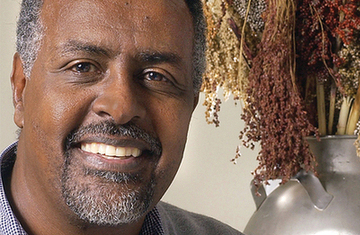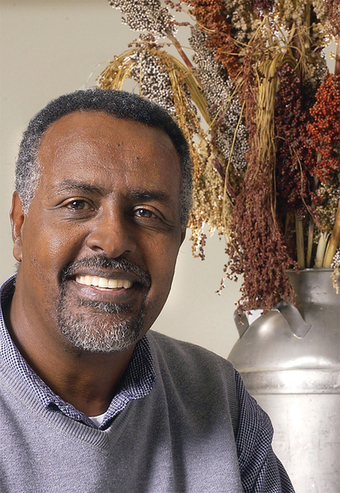Above: Gebisa Ejeta, right, winner of the 2009 World Food
Prize, is congratulated by Samuel Assefa of Ethiopia after
Ejeta’s remarks Friday at the World Food Prize luncheon.
(Photo by Christopher Gannon/ The Register.).
Source: The World Food Prize
The World Food Prize Laureate Award Ceremony is held in the magnificent Iowa State Capitol Building in Des Moines. The ceremony rivals that of the Nobel Prize, drawing over 800 people from more than 65 countries.
Each year, world-class performers take the stage to honor the World Food Prize Laureate. Past performers have included Ray Charles, John Denver and Kathak Gunjan. Following the Ceremony, the celebration continues at the Laureate Award Dinner, held in the Capitol rotunda.
The 2009 Laureate Award Ceremony was held on Thursday, October 15, 2009.
Ethiopian American Named 2009 World Food Prize Laureate

Above: “A Purdue University Professor has received the World
Food Prize, an honor that is considered by many to be the Nobel
Prize of agriculture.” (WLFI) – The 2009 World Food Prize was
awarded to Dr. Gebisa Ejeta of Ethiopia, whose sorghum hybrids
resistant to drought and the devastating Striga weed have
dramatically increased the production and availability of one
of the world’s five principal grains and enhanced the food
supply of hundreds of millions of people in sub-Saharan
Africa.
Dr. Ejeta’s personal journey would lead him from a childhood in a one-room thatched hut in rural Ethiopia to the height of scientific acclaim as a distinguished professor, plant breeder, and geneticist at Purdue University. His work with sorghum, which is a staple in the diet of 500 million people living in sub-Saharan Africa, began in Ethiopia in the 1970s. Working in Sudan in the early 1980s, he developed Hageen Dura-1, the first ever commercial hybrid sorghum in Africa. This hybrid variety was tolerant to drought and out-yielded traditional varieties by up to 150 percent.
Dr. Ejeta next turned his attention to battling the scourge of Striga, a deadly parasitic weed which devastates farmers’ crops and severely limits food availability. Working with a colleague at Purdue University, he discovered the biochemical basis of Striga’s relationship with sorghum, and was able to produce many sorghum varieties resistant to both drought and Striga. In 1994, eight tons of Dr. Ejeta’s drought and Striga-resistant sorghum seeds were distributed to Eritrea, Ethiopia, Kenya, Mali, Mozambique, Niger, Rwanda, Senegal, Somalia, Sudan, Tanzania, and Zimbabwe. Yield increases were as much as four times the yield of local varieties, even in severe drought areas.
“By ridding Africa of the greatest biological impediment to food production, Dr. Ejeta has put himself in the company of some of the greatest researchers and scientists recognized by this award over the past 23 years,” said Vilsack. “The Obama Administration is inspired by the tireless efforts of Dr. Ejeta has demonstrated in the battle to eliminate food insecurity and is committed to employing a comprehensive approach to tackle the scourge of world hunger.”
Dr. Ejeta’s scientific breakthroughs in breeding drought-tolerant and Striga-resistant sorghum have been combined with his persistent efforts to foster economic development and the empowerment of subsistence farmers through the creation of agricultural enterprises in rural Africa. He has led his colleagues in working with national and local authorities and nongovernmental agencies so that smallholder farmers and rural entrepreneurs can catalyze efforts to improve crop productivity, strengthen nutritional security, increase the value of agricultural products, and boost the profitability of agricultural enterprise – thus fostering profound impacts on lives and livelihoods on broader scale across the African continent.
“Dr. Ejeta’s accomplishments in improving sorghum illustrate what can be achieved when cutting-edge technology and international cooperation in agriculture are used to uplift and empower the world’s most vulnerable people,” added Dr. Norman E. Borlaug, founder of the World Food Prize. “His life is as an inspiration for young scientists around the world.”
The 2009 World Food Prize will be formally presented to Dr. Ejeta at a ceremony at the Iowa State Capitol on October 15, 2009. The ceremony will be held as part of the World Food Prize’s 2009 Borlaug Dialogue, which focuses on “Food, Agriculture and National Security in a Globalized World.” Further information about the Laureate Award Ceremony and Symposium can be found at www.worldfoodprize.org.
Clinton Speaks at 2009 World Food Prize Announcement Ceremony
